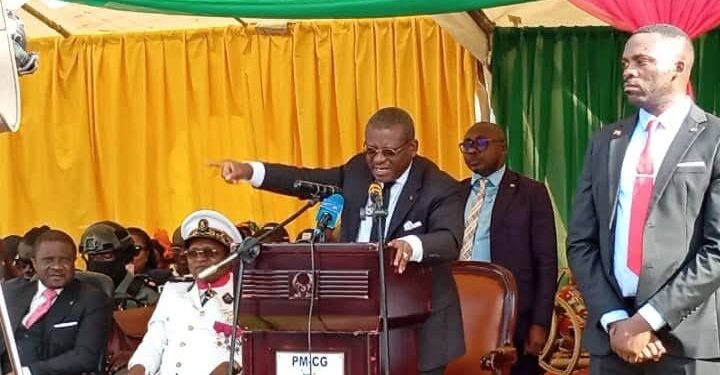Story, Louvier Kindo Tombe
On the three-kilometer access road to the port, heavy machines clawed at the earth. Soil tests, drainage works, bulldozer tracks—signs that long-delayed promises were finally materializing. Officials said the project was 46 percent complete. For residents who had grown weary of promises, this was evidence they could touch and see.
The Prime Minister toured five projects: the road, the extension of the wharf, expansion of the Idenau terminal, new maritime signaling equipment, and a medical center for Bota. On paper, it was technical oversight. On the ground, it felt like rebirth.
From development to campaign
When Dion Ngute finally addressed the crowd, his tone was warm, almost playful. He thanked them for the welcome, marveled at the progress, and then pivoted.
“I think the President of the Republic has decided to modernize Tiko,” he said, pausing before delivering the line that turned the gathering into a rally.
“If you want me to remain Prime Minister and continue this good work, what will you do? Will you vote for President Biya?”
The crowd roared back, their applause drowning out the sea breeze. The message had landed: the port’s future was being tied directly to Biya’s leadership.
Local voices, local faith
The Mayor of Tiko, HRH Peter Ikome Mesoso III, seized the moment. He spoke candidly, almost confessional. “The step you are taking today is giving me coverage for my people to believe I have been telling them the truth,” he said, drawing laughter and nods.
He reminded everyone of Tiko’s natural 12-meter depth—deep enough for large ships—and recalled the days when cars were offloaded here. Then, with a sigh, he voiced what many were thinking: “One more thing is remaining, the airport.”
The General Manager of Douala Port, on his part, pitched the project as part of a broader national modernization drive, pegged at 8 billion CFA francs, a figure meant to assure the crowd that the state was serious.
For all the charts, budgets, and technical details, what lingered was the spectacle: a Prime Minister smiling, mixing nostalgia with promises, and coaxing the crowd toward Biya with the tangible lure of development.
Tiko, once sidelined, was being courted. The new asphalt, the wharf, the bulldozers, all became symbols in a bigger story: that in Cameroon, progress comes with a political price tag.
As the sun dipped behind the mangroves, the cheers still echoed across the port. For Tiko’s people, hope had returned. For Dion Ngute, the mission was clear: to turn that hope into votes for Biya.








